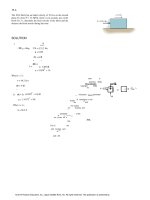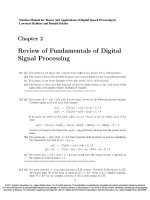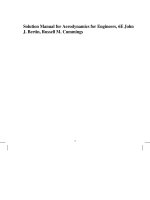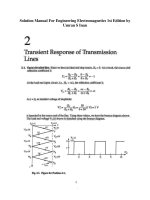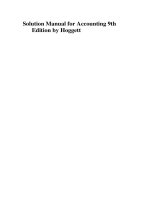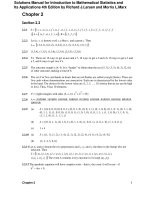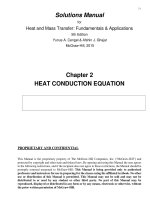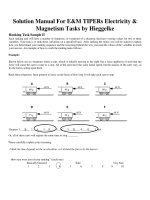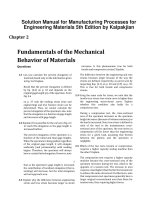Link full download solution manual for e and m TIPERs electricity and magnetism tasks by hieggelke
Bạn đang xem bản rút gọn của tài liệu. Xem và tải ngay bản đầy đủ của tài liệu tại đây (1.39 MB, 21 trang )
Solution Manual For E&M TIPERs Electricity &
Magnetism Tasks by Hieggelke
Ranking Task Sample II
Each ranking task will have a number of situations, or variations of a situation, that have varying values for two or three
variables. Your task is to rank these variations on a specified basis. After ranking the items, you will be asked to explain
how you determined your ranking sequence and the reasoning behind the way you used the values of the variables to reach
your answer. An example of how to work the ranking tasks follows.
Example:
Shown below are six situations where a cart, which is initially moving to the right, has a force applied to it such that the
force will cause the cart to come to a stop. All of the carts have the same initial speed, but the masses of the carts vary, as
do the forces acting upon them.
Rank these situations, from greatest to least, on the basis of how long it will take each cart to stop.
A
B
C
60 N
48 N
48 N
60 g
40 g
60 g
D
E
F
60 N
75 g
40 N
40 N
50 g
40 g
Greatest 1___B___ 2___A___ 3___F____ 4___C __ 5___D____ 6____E____ Least
Or, all of these carts will require the same time to stop. _______
Please carefully explain your reasoning.
I think the time depends on the acceleration, so I divided the forces by the masses.
How sure were you of your ranking? (circle one)
Basically Guessed
1
2
3
4
5
Sure
6
7
8
9
Very Sure
10
Notice in this example that in one instance, two of the situations produced the same value of the ratio used to determine
the ranking, and that the letters for the ones that tied are circled showing they were ranked equally (A and F). In another
instance, three of the remaining situations have the same ranking and they are circled together (C and D and E), showing
this result. In the same way, it is possible that all of the arrangements will give the same result for a particular basis. If that
occurs, and only if that occurs, the option of all equal, or all the same, should be chosen.
Instructors Manual Part 1 E & M TIPERs
ELECTROSTATICS
RANKING TASKS (RT)
ET1-RT1:
CHARGED INSULATING BLOCKS—CHARGE DENSITY
o
V
has a uniform charge density ρ o.
o
Q
o
ρo
Six additional charged insulating blocks are shown below. For each block, the
volume is given as well as either the charge or the charge density.
V
2Vo
o
2Qo
Block A
2Vo
2Qo
Block B
V
2Vo
ρo
Qo
Block C
2Vo
o
2ρo
2ρ o
Block D
Block E
Block F
The block of insulating material shown at right has a volume V . An overall
charge Qo is spread evenly throughout the volume of the block so that the block
Rank the charge densities of the six blocks.
Greatest 1 ___ AEF ____ 2 _______ 3 _______ 4 ___ BD ____ 5 _______ 6 ___ C ____ Least
How sure were you of your ranking? (circle one)
Basically Guessed
Sure
1
2
3
4
5
6
1
7
8
9
Very Sure
10
E & M TIPERs Key
OR, the charge density is the same for all six blocks. ____ OR,
the ranking for the charge density cannot be determined. ____
Carefully explain your reasoning.
Charge density is defined as the ratio of total charge divided by volume, so you compute that for each
block if not already given.
BREAKING A CHARGED INSULATING BLOCK—CHARGE DENSITY
A block of insulating material (labeled O in the diagram) with a width w, height h, and thickness t has
a positive charge +Qo distributed uniformly throughout its volume. The block is then broken into three
pieces, A, B, and C, as shown.
ET1-RT2:
2w/3
w/3
A
B
h/3
C
2h/3
O
Rank the charge densities of the original block O, piece A, piece B, and piece C.
Greatest 1 _____ 2 _____ 3 _____ 4 _____ Least
OR, the charge density is the same for all four pieces. __ X __
OR, the ranking for the charge densities cannot be determined.
____ Carefully explain your reasoning.
The charge density is not going to change because each block will have a charge proportional to its
volume since the charge is uniformly distributed.
2
E & M TIPERs Key
How sure were you of your ranking? (circle one)
Basically Guessed Sure Very Sure 1 2 3 4 5 6 7 8 9 10
How sure were you of your ranking? (circle one)
Basically Guessed
Sure
1
2
3
4
5
6
3
7
8
9
Very Sure
10
E & M TIPERs Key
ET1-RT3: HARGED INSULATING BLOCKS—CHARGE
The block of insulating material shown at right has a volume Vo. An overall charge
Qo is spread uniformly throughout the volume of the block so that the block has a
charge density ρo.
V
o
Q
o
ρo
Six additional charged insulating blocks are shown below. For each block, the volume is given as well as
either the charge or the charge density of the block.
2Vo
Vo
2Qo
Block A
2Vo
2Qo
Block B
2Vo
ρo
Qo
Block C
Block D
2Vo
Vo
2ρo
2ρ o
Block E
Block F
Rank the overall charge of the six blocks.
Greatest 1 ___ F ____ 2 ___ ABDE ____ 3 _______ 4 _______ 5 _______ 6 ___ C ____ Least
OR, the charge is the same for all six blocks. ____ OR,
the ranking for the charge cannot be determined. ____
Carefully explain your reasoning.
To determine the total charge for the blocks where it is not given we need to multiply the charge
density by the volume and then rank the blocks.
4
E & M TIPERs Key
C
PAIRS OF CONNECTED CHARGED CONDUCTORS—CHARGE
Three pairs of charged, isolated, conducting spheres are connected with wires and switches. The
spheres are very far apart. The large spheres have twice the radius of the small spheres. Each sphere on
the left has a charge of +20 nC and each sphere on the right has a charge of +70 nC before the switches
are closed.
ET1-RT4:
A
B
+20 nC
+70 nC
D
C
+20 nC
+70 nC
+20 nC
+70 nC
E
F
Rank the electric charge of the spheres after all of the switches are closed.
Greatest 1 ___ D ____ 2 ___ ABEF ____ 3 _______ 4 _______ 5 _______ 6 ___ C ____ Least
OR, the electric charge is the same for all six spheres. _____ OR,
the ranking of the electric charge cannot be determined. _____
Carefully explain your reasoning.
The charges will move until the potential of each sphere will be the same. Equal size spheres will share
the charge equally, but where the sizes differ the larger sphere will have the larger charge.
How sure were you of your ranking? (circle one)
Basically Guessed Sure Very Sure 1 2 3 4 5 6 7 8 9 10
How sure were you of your ranking? (circle one)
Basically Guessed
Sure
1
2
3
4
5
6
5
7
8
9
Very Sure
10
E & M TIPERs Key
OLLECTION OF SIX CHARGED CONNECTED CONDUCTORS—CHARGE
Six charged conducting spheres are connected with wires and switches. The large spheres have twice
the radius of the small spheres. Each sphere on the left has a charge of +20 nC and each sphere on the
right has a charge of +70 nC before the switches are closed.
ET1-RT5:
A
B
+20 nC
+70 nC
D
C
+20 nC
+70 nC
E
F
+20 nC
+70 nC
Rank the electric charge of the spheres after all of the switches are closed.
Greatest 1 ___ ABD ____ 2 _______ 3 _______ 4 ___ CEF ____ 5 _______ 6 _______ Least
OR, the electric charge is the same for all six spheres. _____ OR,
the ranking of the electric charge cannot be determined. _____
Carefully explain your reasoning.
The charges will move until the potential of each sphere is the same, so the larger spheres will all
have the same charge, as will the three smaller spheres.
PAIRS OF OUTSIDE AND INSIDE CONNECTED CHARGED CONDUCTORS—CHARGE
Two pairs of charged, hollow, spherical conducting shells are connected with wires and switches. The system
AB is very far from CD. The large shells have four times the radius of the small shells. Each pair has a
charge of +20 nC on the small shell and +60 nC on the large shell before the switches are closed.
ET1-RT6:
6
E & M TIPERs Key
C
B
A
+20 nC
+60 nC
C
D
+20 nC
+60 nC
Rank the electric charge on the shells A-D after the switches are closed.
Greatest 1 ___ C ____ 2 ___ B ____ 3 ___ A ____ 4 ___ D ____ Least
OR, the electric charge is the same for all four shells. _____ OR,
the ranking of the electric charge cannot be determined. _____
Carefully explain your reasoning.
The charge flows until the potential is the same of each sphere for A and B but all the charge on D
flows to the outside sphere since there is no charge inside a conducting object giving C the largest
charge.
How sure were you of your ranking? (circle one)
Basically Guessed Sure Very Sure 1 2 3 4 5 6 7 8 9 10
How sure were you of your ranking? (circle one)
Basically Guessed
1
2
3
4
5
Sure
6
7
7
8
9
Very Sure
10
E & M TIPERs Key
HARGED ROD AND ELECTROSCOPE—EXCESS CHARGE
In each of the four cases below, a charged rod is brought close to an electroscope that is initially
uncharged. In cases A and B, the rod is positively charged; in cases C and D, the rod is negatively
charged. In cases A and C, the leaf of the electroscope is deflected the same amount, which is more than
it is deflected in cases B and D.
ET1-RT7:
Rank the net charge on the electroscope while the charged rod is near. (This will be a negative value
if there is more negative than positive charge on the electroscope.)
Greatest positive 1 _______ 2 _______ 3 _______ 4 _______ Greatest negative
OR, the net charge is the same for all four situations but it is not zero. _______
OR, the net charge is zero for all of these situations. ___ X ____
OR, the ranking for the net charge cannot be determined from the information given. _______
Carefully explain your reasoning.
The net charge on the electroscope, assuming the rod does not touch it, is zero in all four cases
since no charge is transferred.
THREE-DIMENSIONAL LOCATIONS IN A CONSTANT ELECTRIC POTENTIAL—FORCE
The electric potential has a constant value of six volts everywhere in a three-dimensional region, part
of which is shown below.
ET3-RT1:
How sure were you of your ranking? (circle one)
Basically Guessed
1
2
3
4
5
Sure
6
8
7
8
9
Very Sure
10
E & M TIPERs Key
C
Rank the strength (magnitude) of the electric force on a charge of +2 µC if it is placed at the
labeled points.
Greatest 1 ______ 2 ______ 3 ______ 4 ______ 5 ______ 6 ______ 7 ______ 8 ______ Least
OR, the electric force is the same but not zero for all of these points. ____ OR, the electric
force is zero for all of these points. __ X __
OR, the ranking for the electric force cannot be determined for all of these points. ____ Carefully
explain your reasoning.
The field is zero since the potential does not change, thus the force is zero.
ARRANGED IN A TRIANGLE—FORCE
In each case below, three particles are fixed in place at the vertices of an equilateral triangle. The triangles are
all the same size. The particles are charged as shown. (In case C, the top particle has no charge.)
ET3-RT2:
HARGES
2q
2q
A
2q
0
B
q
q
C
–q
2q2q
How sure were you of your ranking? (circle one)
Basically Guessed
Sure
1
2
3
4
5
6
9
7
8
9
Very Sure
10
E & M TIPERs Key
2q
2q
D
q
2q
E
F
–2q2q
–2q
2q2q
Rank the magnitude of the net electric force on the lower left particle.
Greatest 1 __ E ___ 2 __ A ___ 3 __ F ___ 4 __ B ___ 5 ___ CD __ 6 _____ Least
OR, the net electric force on the lower left particle is the same for all six cases. ____
OR, the ranking for the net electric force on the lower left particle cannot be determined.
____ Carefully explain your reasoning.
We apply Coulomb’s Law to the interaction between the lower left charge and the other two, taking
account of the vector process of adding the forces.
0
C
2q
–q
2q
2q
F
2q
How sure were you of your ranking? (circle one)
Basically Guessed
1
2
3
4
5
Sure
6
10
7
–2q
2q
8
9
Very Sure
10
E & M TIPERs Key
Each
CHARGES IN A PLANE—FORCE
In each case shown below, small charged particles are fixed on grids having the same spacing.
charge q is identical, and all other charges have a magnitude that is an integer multiple of Q.
ET3-RT3:
Rank the magnitude of the electric force on the charge labeled q due to the other charges.
Greatest 1 __ ADEH _ 2 ______ 3 ______ 4 ______ 5 _ F ___ 6 ___G___ 7 ___ B __ 8 ___ C ___ Least
OR, the electric force on q is the same but not zero for all eight cases. ____ OR, the electric force on q is
zero for all eight cases. ____
OR, the ranking for the electric force on q cannot be determined. ____ Carefully
explain your reasoning.
Apply Coulomb’s Law to the interaction between each charge and q and then perform the vector
sum when more than one charge is involved.
11
E & M TIPERs Key
Each
How sure were you of your ranking? (circle one)
Basically Guessed Sure Very Sure 1 2 3 4 5 6 7 8 9 10
ET3-RT4: TWO CHARGES—FORCE
In each case shown below, small charged particles are fixed on grids having the same spacing.
charge q is identical, and all the other charges have a magnitude that is an integer multiple of q.
A
B
–4q
q
q
C
+8q
D
+2q
q
q
–8q
E
F
q
+16q
q
+4q
Rank the magnitude of the electric force on the charge labeled q due to the other charge.
Greatest 1 __ ACDE ___ 2 _____ 3 _____ 4 _____ 5 __ F ___ 6 __ B ___ Least
OR, the electric force on q is the same but not zero for all six cases. ____ OR,
the electric force on q is zero for all six cases. ____
OR, the ranking for the electric force on q cannot be determined. ____ Carefully
explain your reasoning.
The force (Coulomb’s Law) is proportional to the product of the charges and inversely proportional to the
square of the distance between them. The larger charges and the closer charges are ranked higher.
12
E & M TIPERs Key
Each
How sure were you of your ranking? (circle one)
Basically Guessed Sure Very Sure 1 2 3 4 5 6 7 8 9 10
ET3-RT5: TWO AND THREE CHARGES IN A LINE—FORCE
In each case shown below, small charged particles are fixed on grids having the same spacing.
charge q is identical, and all the other charges have a magnitude that is an integer multiple of q.
A
B
–2q
–4q
q
C
q
D
+2q
q
–2q
+2q
E
q
+2q
F
–q
q
–2q
+2q
q
Rank the magnitude of the electric force on the charge labeled q due to the other charges.
Greatest 1 __ ADE ___ 2 _____ 3 _____ 4 __ BF ___ 5 _____ 6 __ C ___ Least
OR, the electric force on q is the same but not zero for all six cases. ____
OR, the electric force on q is zero for all six cases. ____
OR, the ranking for the electric force on q cannot be determined. ____ Carefully
explain your reasoning.
In cases A, B and F the net force on q is found simply using Coulomb’s Law. In C, D and E, use
Coulomb’s law to find the magnitude of the forces on q by each of the other two charges. Then, taking
into consideration the direction of these forces, add them vectorially to find the magnitude of the net
force on q.
13
E & M TIPERs Key
Each
How sure were you of your ranking? (circle one)
Basically Guessed Sure Very Sure 1 2 3 4 5 6 7 8 9 10
14
E & M TIPERs Key
CHARGED RODS AND POINT CHARGES—FORCE
In each case A-D, a point charge +q is fixed in place as well as
some other point charges or charged rods.
ET3-RT6:
The charged insulating rod in case A has a length x and a charge +2Q
distributed uniformly along it. The charged insulating rod in case D is an
arc of radius y, and has a charge +2Q distributed uniformly along it.
Rank the magnitude of the electric force on +q due to the
other charges in each case.
Greatest 1 __ C ___ 2 __ D ___ 3 __ A ___ 4 __ B ___ Least
OR, the electric force on +q is the same for all four cases. ____ OR, the
ranking for the electric force on +q cannot be determined.____
Carefully explain your reasoning.
C has greatest force since total charge 2Q is concentrated in one spot C
at distance y. B is least since charge is split in half and each half is
farther away and greatest angle. A and D are both smaller than C since the charge is spread out, but
larger than B since more of the charge is closer to q and closer to being on the same vertical line. D
is greater than A since the charge in D is never farther than the distance y, whereas in A, the charge
at the ends of the line is farther away than y.
How sure were you of your ranking? (circle one)
Basically Guessed Sure Very Sure 1 2 3 4 5 6 7 8 9 10
15
E & M TIPERs Key
CHARGED CURVED ROD—FORCE
A point charge +q is placed near a curved, charged, insulating rod as shown at left below. The charge is
placed at the center of curvature of the curved rod. For each of the five cases A-E, the charge density
on the rod varies according to the graphs, but the total charge is the same.
ET3-RT7:
A
Charge density
B
Charge density
d
Charge density
θ
θ
θ
varies along
rod
+q
–60°–40°–20° 0° 20 ° 40° 60 °
–60°–40°–20° 0° 20° 40° 60 °
Rank the magnitude of the electric force on +q due to the charge in the curved rod in each case.
Greatest 1 ___ D ____ 2 ___ A ____ 3 ___ C ____ 4 ___ B ____ 5 ___ E ____ Least
OR, the electric force on +q is the same (but not zero) for all five cases. ____
OR, the electric force on +q is zero for all five cases. ____
OR, the ranking for the electric force on +q cannot be determined. ____ Carefully
explain your reasoning.
Vector addition or integration yields that more concentrated charge distribution gives larger force since
the x-components cancel due to symmetry. The largest will be the one where the y-components are
larger. This will occur when the charge is concentrated near θ=0.
16
E & M TIPERs Key
How sure were you of your ranking? (circle one)
Basically Guessed
Sure
Very Sure
1
2
3
4
5
6
7
8
9
10
ET3-RT8: THREE-DIMENSIONAL LOCATIONS NEAR A POINT CHARGE—ELECTRIC FORCE
There is a positive point charge +q located at (0, 3, 0) as shown in the three-dimensional region below.
Within that region are points located on the corners of two cubes as shown below. The small cube has
edges of 1 centimeter length and the larger cube has edges of 3 centimeter length.
Rank the strength (magnitude) of the electric force on a +3q point charge if it is placed at the labeled
points.
Greatest 1 ___ C ___ 2 __ D ___ 3 __ BG __ 4 ______ 5 _ AFH __ 6 ______ 7 ______ 8 __ E ___ Least
OR, the electric force is the same but not zero for all these points. ____ OR, the electric force is zero for
all these points. ____
OR, the ranking for the electric force cannot be determined for all these points. ____ Carefully
explain your reasoning.
The force between two point charges decreases as the distance between those charges increases.
How sure were you of your ranking? (circle one)
17
E & M TIPERs Key
Basically Guessed Sure Very Sure 1 2 3 4 5 6 7 8 9 10
ET3-RT9: SPHERE AND A POINT CHARGE—FORCE
A point charge is placed a distance d away from a neutral metal sphere. The diameters of the spheres in A
and D are the same and smaller than the equal diameters in B and C. The point charge is positive for
cases A and B, and negative for C and D.
A
B
+q
d
+
d
q
C
–q
–q
d
d
D
Rank the force exerted on the point charge by the sphere (let a force to the right be a
positive force and a force to the left be a negative force).
Greatest positive 1 __ BC ____ 2 ______ 3 __ AD ____ 4 ______ Greatest negative
OR, the force is the same but not zero for all four situations. ____
OR, the force is zero for all these situations. ____ OR, the
ranking for the forces cannot be determined. ____
Carefully explain your reasoning.
The point charges in all these cases induce a charge distribution on the metal sphere that causes them
to attract each other since the charge induced on the side of the sphere closest is opposite the sign of the
point charge. These attract while the charge on the side farthest will have the same sign of the point
charge, which will cause a repelling force. Since in each case the charge is the same distance from the
sphere, the effect of the farthest side will determine the ranking. B and C have the largest net force
because the spheres are larger and thus the repulsion force is smaller.
How sure were you of your ranking? (circle one)
18
E & M TIPERs Key
Basically Guessed Sure Very Sure 1 2 3 4 5 6 7 8 9 10
ET3-RT10: THREE-DIMENSIONAL LOCATIONS IN A UNIFORM ELECTRIC FIELD—ELECTRIC FORCE
All the labeled points are within a region of space with a uniform electric field. The electric field points
toward the top of the page (that is, in the positive z-direction).
Rank the magnitude of the electric force on a charge of +2 µC at the labeled points.
Greatest 1 ______ 2 ______ 3 ______ 4 ______ 5 ______ 6 ______ 7 ______ 8 ______ Least
OR, the electric force is the same but not zero for all of these points. __ X __ OR, the electric
force is zero for all of these points. ____
OR, the ranking for the electric force cannot be determined for all of these points. ____ Carefully
explain your reasoning.
Since the field is the same at all these points and F=qE, the electric force will also be the same for
the charge.
How sure were you of your ranking? (circle one)
19
E & M TIPERs Key
Basically Guessed Sure Very Sure 1 2 3 4 5 6 7 8 9 10
20
E & M TIPERs Key
